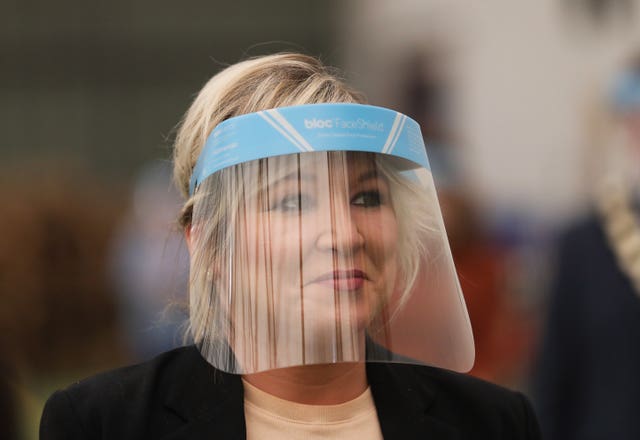Stormont ministers to publish five-step lockdown exit plan on Tuesday
There will be no milestone dates in the plan, with progress only envisaged when certain scientific and public health criteria are met.

Northern Ireland’s five-step plan to emerge from coronavirus restrictions will be published on Tuesday.
First Minister Arlene Foster and Deputy First Minister Michelle O’Neill are expected to outline the blueprint to the Assembly in Belfast.
Ministers discussed the plan at a meeting of the powersharing executive on Monday.
While a final version had not been formally signed off by Monday afternoon, with a few remaining details still to be agreed, ministers were confident it will be completed in time to present to MLAs on Tuesday.

Significantly, the plan will not include projected milestone dates for when the region could move from one step to the next.
Instead, it will outline the scientific and public health criteria that must be met for progression to happen.
That includes the infection rate (RO) level and the capacity within hospitals dealing with coronavirus.
Ministers are seeking to prioritise measures that create the greatest societal benefit with the lowest infection risk.
The executive is legally obliged to review the current lockdown regulations every three weeks, but the public will be cautioned not to expect that each review will result in a decision to move to another phase.
It is anticipated that some three-week reviews will not bring any change to the regulations, and some could even see the region return to an earlier phase in the plan.
People will be told to expect the journey to recovery to be gradual and incremental.
It is understood gatherings of four to six people in outdoor locations, with social distancing measures in place, will be permitted in the first step.
However, cafes, restaurants and pubs will have to wait until step five before they can reopen.
It is anticipated that schools will not reopen until the start of the new school year in September.
Unlike England, there are no plans to increase the level of fines issued to those who breach social distancing rules, although the executive is to keep this under review.
Step one could be given the green light at the end of the month, the end of the current three-week extension.
However, ministers are expected to move on a small number of the current measures before then.
Ministers will meet again later in the week to consider allowing people to exercise more than once a day, and the reopening of garden centres and churches for the purpose of solitary prayer.
A further three deaths of patients with Covid-19 were reported by the Department of Health on Monday, taking the total in the region to 438.
The coronavirus response has been the first major test of a powersharing administration at Stormont, which was restored in January after a three-year hiatus.

On Monday, Mrs Foster told BBC Radio Ulster that Northern Ireland needed a specific plan reflecting the circumstances in the region.
“The whole point of devolution is the fact that we can have localised solutions within a UK framework and I think that that is what we are doing across the UK at the moment,” she said.
“The reason for that, of course, is that the transmission of the virus is different in different parts of the UK, therefore we should deal with the virus in the way that we need to deal with it here in Northern Ireland.”
On Monday, Mrs Foster said allowing outdoor activities before indoor events made sense given how the virus spread.
“We will be able to move faster to allow outdoor activities than large gatherings inside,” she said.
“I think what we need to do is take a graduated approach to this.
“This is novel coronavirus and therefore that means it is completely new, therefore we have to listen to what our experts are telling us about transmission of the disease, and in doing so plot a graduated plan forward, a safe plan, so that we can move to a new normal where people can take part in work, they can take part in society again.”
Ms O’Neill told the Irish News that the plan would differ from the Irish Government’s blueprint, which does set out a series of projected dates.
“Our plan will not be calendar led as it is in the south, where they have assigned certain dates to it,” she said.
“I would be worried about that approach for this reason – you don’t know how this disease is going to spread.
“What we intend to do is set out guiding principles as to how we move to each stage and what we intend to do.
“We will set out different phases and they will be reviewed on a three weekly basis in accordance with the best international health advice.
“Every measure will be gradual, there’s never going to be at any stage a ‘big bang’. It’s going to be incremental.”
At Stormont’s daily Covid-19 briefing at Stormont, DUP junior minister Gordon Lyon said people needed to be “realistic” about what the coming months would involve.
“There will be no dramatic lifting of restrictions,” he said. “Each step will be incremental and cautious.
“Social distancing is going to be with us for a very long time. Just as it has become a reality of how we shop, it will be a reality of how we work together, study together, how we socialise, and even how we worship.”
Sinn Fein junior minister Declan Kearney said the plan would be “cautious and pragmatic”.
“By adopting an approach that is informed by the science it is also crucial that we do not set arbitrary timeframes for easing certain restrictions,” he said.
“We must retain the flexibility to respond to the emerging situation and achieve the best possible outcomes for all of our people.”





